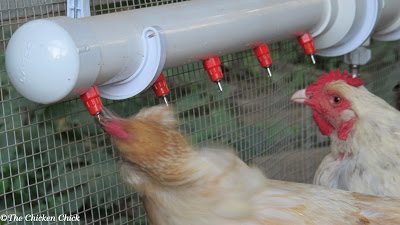
4 Common Chicken Diseases And Preventive Measures
Healthy chickens are happy chickens. To keep your chicken healthy, there are certain things that you need to know to keep chickens healthy. Also, you should know about the chicken disease, preventive measures, and the cure to treat the diseases.
All types of chicken disease have different preventive measures. So, learning each preventive measure can be very beneficial. And there is basic hygiene that you need to know to protect the chicken from diseases.
Be learning about diseases, let’s learn to clean waterer, feeder, and chicken coop.
How To Clean A Chicken Waterer?
You should clean the chicken waterer very often inside and out with hot soapy water. After that allow it to dry before refilling it. And to avoid the formation of algae on the waterer, you can scrub it with vinegar water. Vinegar is very effective in lowering the pH level of the water.
You can prevent algae formation in the water. To prevent the waterer from turning green, you need to keep it away from direct sunlight. But make sure chickens are not near while cleaning the waterer.

How To Clean A Chicken Feeder?
Cleaning the chicken feeder and chicken waterer is quite similar. You can use the same method to clean a chicken feeder as a chicken waterer. Just make sure you clean remove all the remaining from the chicken feeder before cleaning it.

How To Clean The Chicken Coop?
It’s necessary to clean the coop regularly. Cleaning the chicken coop can be a time-consuming task if done in a proper manner. You need to clean the chicken coop at least once a week.
Start by removing wet or soiled bedding daily. Then add the absorbent wood shaving to the floor to keep the area dry and odor-free. You need to replace the bedding every week. And once a month, you can deep clean the coop by removing everything from the coop and sanitize it regularly.
So, this is basic hygiene that you need to apply weekly. And once a month, you can deep clean the chicken waterer, feeder, and coop to avoid unwanted diseases.

Four Most Common Chicken Diseases
No matter how clean you keep feeder, coop, and waterer, chicken can get diseases. If you are aware of the disease and know the ways to prevent and cure the diseases, then you will get a good profit from the hatchery.
1. Fowlpox
Fowlpox is a worldwide disease of poultry caused by fowlpox are distinct from one another but antigenically similar, possible hosts including chickens, turkey, quail, and canaries. It can come in two forms- wet or dry. In the dry form, the unfeathered area of your bird will have wart-like lesions that heal in about two weeks.
There is no exact treatment to cure the fowl pox, but it will typically go away after a few weeks on its own. However, it is suggested to give extra care and comfort to sick chickens. There are special vaccines that can prevent fowlpox in chicken, but if any chicken show signs of infection, make sure to keep that chicken separate from rest of the group
Also, make sure to protect the chicken from mosquitoes since mosquitoes are able to transmit the disease from flock to flock.
2. Infectious Bronchitis
Chicken gets cough and cold just like a human. And it is also contagious. If the chicken becomes infected, you will notice that chicken will minimize to lay eggs, the consumption of food and water will decrease, and you may notice labored breathing from your birds.
For this disease, you can give your birds antibiotics for a few days to makes sure that chicken will not get infected with other diseases, but otherwise, you just have to wait it out.
You can use a preventive measures like cleaning the waterer and other things. However, it’s no guarantee.
3. Marek’s Disease
Marek’s disease, also known as fowl paralysis, affects chickens between 12 and 25 weeks old. If chicken has developed tumors, has irregularly shaped pupils, or develops partial paralysis, it’s likely that they have Marek’s disease.
Marek’s disease is a form of avian cancer, there is unfortunately not much that can be done for infected chicks. As it’s a virus and is transmitted when a chicken breathes in feather dander from another infected bird.
While this disease sounds dangerous, there are vaccines for this disease. Newly hatched birds can be vaccinated for Marek’s disease to help reduce the likelihood of infection.
4. Newcastle Disease
Symptoms of Newcastle in the chicken are breathing difficulties, nasal discharge, murky eyes, and reduction in egg-laying. Sometimes chickens can experience twisting in their neck and paralysis in their legs and wings. There are varying strains of this poultry disease, some of which are more lethal than others.
Just like the above-mentioned diseases, you can give your birds antibiotics for a few days to avoid any other bacterial infections. And this disease is carried by wild birds, so it is vaccinating chickens is very important. Also better to practice good sanitation since a person can also get infected by the birds via clothing or shoes.
Poultry Feed Medicine: Types of antibiotics for domestic birds
